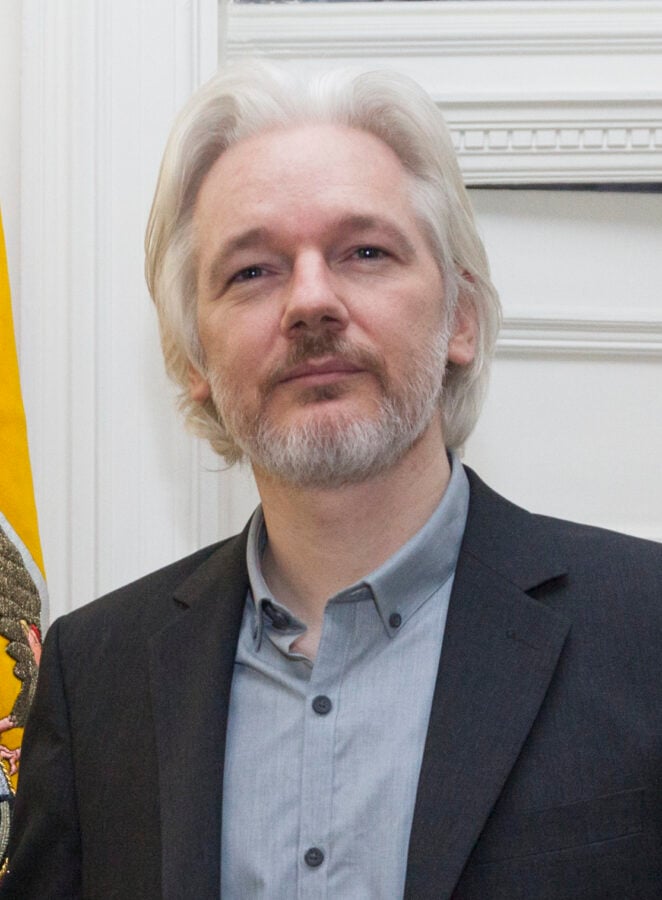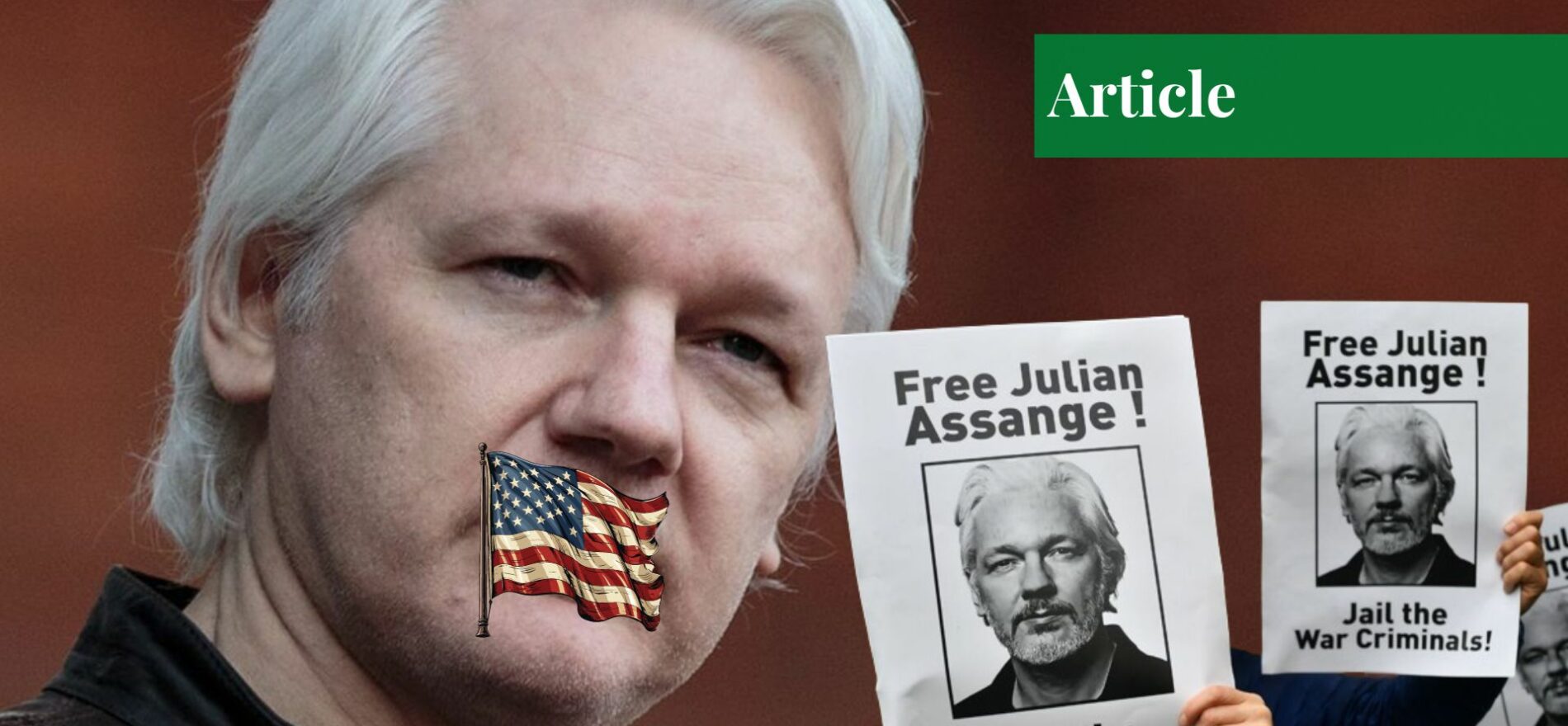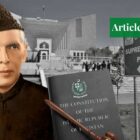Sadia Iqbal is an MPhil candidate and a researcher interested in global geopolitical issues. She is also a gold medalist in the 2020 MA batch of Punjab University.
Who is Julian Assange?
Julian Assange, an Australian-born journalist, is a co-founder of a non-profit organization, named WikiLeaks. It’s a publisher and media organization that was founded in 2006 and based in Iceland. His organization has released multiple troves of confidential U.S. military records and government secrets that include evidence of war crimes, human rights abuses, and the illegal actions by US military and civilian leadership in the wars in Iraq and Afghanistan.

In 2010, after publishing around 1 million documents, Assange began facing criminal charges on 18 counts including sexual assault, computer hacking, and espionage. To understand the case of Julian Assange, we will analyze two instances in which he has exposed the inner workings of governments and corporations in the West.
Collateral Damage in Iraq
On April 5, 2010, WikiLeaks released a classified US military video titled “Collateral Murder” that depicts the indiscriminate killing of over a dozen people in the Iraqi suburb of New Baghdad, including two Reuters news staff. The video was filmed from the helicopter’s gun sight and captured the audio communication between the crew members, who mistook the journalists’ cameras for weapons and opened fire without verifying their targets. The video also showed the crew firing at a van that stopped to help the wounded and making derogatory remarks about the victims.
The military did not reveal how the Reuters staff were killed and stated that they did not know how the children were injured. After demands by Reuters, the incident was investigated and the US military concluded that the actions of the soldiers were in accordance with the law of armed conflict and its own “rules of engagement.” It distinguishes collateral murder and collateral damage, as the latter is an accepted consequence of warfare. The law of armed conflict allows soldiers to carry out attacks against military objectives provided the attacks are consistent with the requirement of the principle of proportionality.
Consequently, WikiLeaks has released the classified rules of engagement for 2006, 2007, and 2008, revealing these rules before, during, and after the killings. The video sparked global outrage and raised questions about the conduct and accountability of the US military in Iraq. WikiLeaks claimed that the video exposed the “indiscriminate slaying” of civilians and the cover-up of the incident by the US military, which initially stated that the helicopter was engaged in combat operations against armed insurgents.
This revelation of the video and documents has raised huge concern and backlash about the rules of engagement and ethics of the U.S. military’s action in Iraq. The video shows the pilot’s and his accompanying team’s lack of concern for the lives of apparently ordinary citizens who did not pose an immediate threat. Their apathy is obvious because they appear to be joking about the killings. This has raised serious questions that hold the military accountable for its lack of respect for human life.
WikiLeaks later released the full footage of the video which reveals that the US military misrepresented the events and refused to release the full video. These post-event actions of the military can be seen as undermining the public’s right to know and have fueled the perception of a lack of transparency of the military actions. A renowned activist, Arundhati Roy, had very well questioned this public right to know in her speeches. She stated:
“When the United States invaded Iraq, a New York Times/CBS News survey estimated that 42 percent of the American public believed that Saddam Hussein was directly responsible for the September 11th attacks on the World Trade Center and the Pentagon. And an ABC News poll said that 55 percent of Americans believed that Saddam Hussein directly supported Al Qaida. None of this opinion is based on evidence (because there isn’t any). All of it is based on insinuation, auto-suggestion, and outright lies circulated by the U.S. corporate media, otherwise known as the “Free Press,” that hollow pillar on which contemporary American democracy rests. Public support in the U.S. for the war against Iraq was founded on a multi-tiered edifice of falsehood and deceit, coordinated by the U.S. government and faithfully amplified by the corporate media.”
In conclusion, “collateral murder” acts as a powerful reminder of the ethical dilemmas and human costs of military interventions. It has prompted discussions about the rules of engagement, transparency, and accountability in armed conflicts.
Afghan War Logs
In 2010, WikiLeaks released Afghan War Logs, a collection of 92,000 confidential US military documents. The most brazen revelation deals with civilian casualties and war crimes from NATO forces, attacks against the Taliban coalition, and intelligence reports. Afghan War Logs met with a huge backlash. Many critics argued that the logs were released in 2010 when the war had already lost favor among the public. The context and timings were also seen as politically motivated to shape public opinion such that it undermined the US war efforts in Afghanistan.
It can be argued that the documents released were primarily US military assessments and did not represent the views of other important stakeholders, such as Afghan civilians. Therefore, these logs did not capture the full complexity and situation on the ground. The release does not highlight operational security or put lives at risk. Additionally, the critics also raised questions on the reliability and authenticity of the document as it remained impossible to verify the authenticity independently.
Despite these criticisms, the Afghan War Logs have raised several genuine concerns about human rights abuses, accountability, military action, and the responsibility of the government during military operations. It brought to fore the need for reforms regarding rules of engagement and military action during foreign deployments. The leaked documents also shed light on the disconcerting pattern of disregard for civilian life and the effectiveness of Western efforts in stabilizing Afghanistan.
Furthermore, the US establishment’s response to the publication of the logs sparked critical debates on other aspects within the US politico-social environment, such as the security of journalists and freedom of the press in releasing critical/investigative reports. The release of the Afghan War Logs presented both strengths and weaknesses as it is criticized for its limited perspective. However, they provided valuable insights into significant systemic issues within the war in Afghanistan.
Julian Assange Case
After unveiling the classified documents, and the hypocrisy and crimes of the West, Julian Assange is wanted by the US authorities. The US claims that he has breached the law and threatened the national security of the state, instead of addressing the serious issues raised by him. Indictments on multiple counts surfaced including a sexual assault allegation from Swedish prosecutors in 2010. Assange turned himself in to the London jail, labeling the Swedish allegation a “planned campaign” against him. However, later he was released on bail.
In 2012, while fighting his legal saga, he took refuge and political asylum in Ecuador’s embassy in London, fearing that British rule might approve his extradition to Sweden which most likely would end up handing him over to the US government. However, in 2019, he was removed from the diplomatic haven and arrested by the London Police as he had breached jail conditions. Completing the British jail sentence, he was incarcerated in Belmarsh prison in London. He was charged and summoned by the US government, on behalf of the allegation of spying and hacking to decipher the US government’s confidential documents.
On 17th June 2022, Home Secretary Priti Patel of the UK approved the extradition of Julian Assange. The latest ruling of the court has met with huge backlash marking it as a “dark day for press freedom and Western democracy.” It is indeed a blot on the so-called liberal Western democracies, that instead of correcting the wrongs raised by Assange, the US has taken the tragic route of defaming and criminally charging this whistle-blower.
Conclusion
The UK government’s latest decision to extradite Assange to the US questions the hollow pillars of democracy and threatens the freedom of the press. The US and its Western allies have been continuously criticizing Russian authoritarianism by aiding billions of dollars in weaponry. Whereas, Julian Assange is being punished for doing his job of exposing the faulty inner workings of governments and corporations in the West. Through WikiLeaks, he has raised pertinent questions on the transparency of the Western governments’ actions and revealed the gap between their public rhetoric and actual practices.
By publishing these classified contents, he has also prompted important discussions on space for investigative journalism in a “democratic society,” the need for reforms in rules of engagement during wartime, the lack of accountability in governance when security considerations override all other issues, and the conduct of international affairs in the Western world. Julian Assange, today, stands as the torchbearer of the ideals of freedom of the press, considerate discussions on foreign military engagements, and open governance.
If you want to submit your articles, research papers, and book reviews, please check the Submissions page.
The views and opinions expressed in this article/paper are the author’s own and do not necessarily reflect the editorial position of Paradigm Shift.


















